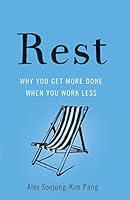Rest
“Whatever the worries of the hour or the threats of the future, once the picture has begun to flow along, there is no room for them.” It offered an inexhaustible supply of new subjects, new skills to master, and a lifetime of challenges. “Every step may be fruitful. Yet there will stretch out before you an ever-lengthening, ever-ascending, ever-imp
... See moreAlex Soojung-Kim Pang • Rest
“Creativity doesn’t drive the work; the work drives creativity,” Pang writes. “A routine creates a landing place for the muse.”
Alex Soojung-Kim Pang • Rest
A day that starts with work creates rest that can be enjoyed without guilt. When you start early, the rest you take is the rest you’ve earned.
Alex Soojung-Kim Pang • Rest
children whose brains demonstrate greater levels of connectivity in the resting state tend to have superior reading skills, better memory, and higher scores on intelligence and attention tests. It also relates to their levels of empathy and ability to imagine playmates’ and parents’ points of view: the better-developed your DMN, other scientists ha
... See moreAlex Soojung-Kim Pang • Rest
This is a model described by English psychologist Graham Wallas in his 1926 book The Art of Thought. After studying accounts of creative breakthroughs and moments of insight, Wallas concluded that they follow a four-stage process. The first stage, preparation, consists of all the visible, conscious activity necessary in modern creative and producti
... See moreAlex Soojung-Kim Pang • Rest
This is how we’ve come to believe that world-class performance comes after 10,000 hours of practice. But that’s wrong. It comes after 10,000 hours of deliberate practice, 12,500 hours of deliberate rest, and 30,000 hours of sleep.
Alex Soojung-Kim Pang • Rest
“It’s a form of meditation because you are engaged to such an extent with the world, with the environment, you have to pay such attention to every little unevenness in the rock, that your inner voice—this constant critic that’s always in your head—is completely silent.”
Alex Soojung-Kim Pang • Rest
First, the great students didn’t just practice more than the average, they practiced more deliberately. During deliberate practice, Ericsson explained, you’re “engaging with full concentration in a special activity to improve one’s performance.” You’re not just doing reps, lobbing balls, or playing scales. Deliberate practice is focused, structured
... See moreAlex Soojung-Kim Pang • Rest
Researchers have also found that a small amount of background noise can boost creativity and that some people perform better on creativity tests when listening to music. This is why some people like working in cafés: the low buzz of conversations and comings and goings provides a useful stimulus, loosening the mind just enough to encourage associat
... See more